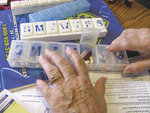

When is a donut not so sweet? When it’s connected to Medicare’s Part D prescription drug coverage gap.
Dubbed the “Donut Hole,” the gap in prescription drug coverage, which occurs after a Medicare recipient has hit a certain payment threshold but before catastrophic coverage kicks in, has been plaguing seniors for nearly a decade.
“I’d never heard of it before last year,” says longtime Battle Ground resident Lorri Bisconer. “I don’t know if other people realize that this is happening.”
Like many others who have fallen into this expensive abyss, Bisconer says she was shocked when her prescription drug bills quadrupled overnight. Instead of paying $45 to $100 a month for the pills that keep her diabetes and blood pressure in check, the 75-year-old was suddenly expected to pay more than $400 a month.
“I couldn’t do it,” Bisconer says. “Last year I had to stop taking my medication for two months.”
This year, Bisconer has struggled to pay for the insulin that her doctors prescribed to manage her adult-onset diabetes.
“It’s half of my Social Security check,” she says. “I’ve used my savings to pay it this year, but I don’t know what I’ll do next year. Maybe I can cut back … only take it every other day.”
Most Medicare recipients never have to worry about the Donut Hole, which stops paying for a member’s prescription drugs once a member has reached a maximum for drug coverage — $2,850 in 2014 — and doesn’t go away until that member has paid enough in out-of-pocket expenses — $4,550 in 2014 — and entered Medicare’s catastrophic coverage category.
However, a 2010 University of California, Los Angeles, study published in the Journal of General Internal Medicine found that women and patients with diabetes and dementia were most likely to fall into the Medicare prescription drug coverage gap.
Bisconer has seen the truth behind this report. Sitting at her dining room table, surrounded by medical bills and prescription drug benefits reports, Bisconer points out that her diabetes medications, which have no generic, less expensive alternatives, cost way more than her husband Bob’s prescriptions, despite the fact that Bob is recovering from a stroke and several heart attacks.
“Bob doesn’t fall into the Donut Hole,” Bisconer says. “But I reach it in July!”
A little less than halfway through the year, Medicare stops paying for Lorri’s prescription medications, leaving her at risk of stroke and heart attack if she can’t afford the long-acting insulin injections and daily diabetes and blood pressure pills her physicians have recommended.
Instead of her reasonable co-pays, Bisconer faces more than $400 in monthly medication bills each month until she reaches the maximum out-of-pocket payment of $4,550, which bumps her into Medicare’s catastrophic coverage category. According to her most recent Medicare statement, Bisconer won’t climb out of the Donut Hole until mid-December.
The Affordable Care Act, which passed in 2010 and is sometimes referred to as Obamacare, is gradually closing the Medicare Part D prescription drug coverage gap. Prior to 2010, Medicare members who fell into the Donut Hole had to pay all of their prescription drug costs. Under the Affordable Care Act, prescription drug makers are now footing more than half the bill for Medicare recipients in the Donut Hole. The percentage of what the drug companies pay will increase each year until the coverage gap is essentially closed in 2020. Before 2010, Bisconer would have had to pay more than $800 a month for her prescription drugs during her Donut Hole period.
In a sad twist of fate, the Bisconers combined income, which includes Social Security, Lorri’s part-time job and Bob’s pension, is barely enough to make ends meet, but too much to qualify for the Medicare Extra Help program, which would pay for Bisconer’s prescriptions and help her avoid the donut hole.
“It’s not right,” Bisconer says, shaking her head at the mounting pile of medical bills and looking at a picture of her husband taken before he suffered a stroke in 2010. “We’ve worked hard … I’ve been working since I was a girl.”
In fact, the retired school bus driver — Bisconer transported special education students in the Battle Ground Public Schools district for 27 years — is still working. To make ends meet, Bisconer works part-time as a cashier at the local ACE Hardware store.
“It’s a great place. I’m lucky to have such a good boss for what is probably my last job,” Bisconer says. “During the summer and the holidays, I work three or four days a week.”
Life for this couple, who have been married for 32 years, wasn’t always just about prescription drug costs and medical bills. In fact, before Bob had his stroke in 2010, the Bisconers were enjoying their retirement years on a one-acre property in eastern Washington, where they had horses and friends and two homes. Flash-forward four years and a few life-saving surgeries for Bob and the Bisconers are back in Battle Ground. They’re closer to family now — together the couple has four grown children, eight grandchildren and one great-grandchild — but they can’t afford to live on a big piece of land anymore. Instead, they reside in a small trailer with their two aging cats and two big dogs.
“It’s OK,” Bisconer says. “We have some nice neighbors here … but I miss having horses. And the dogs definitely miss having all of that land.”
Life might be a little easier if she didn’t fall into the Donut Hole for half the year, Bisconer says. There would be more money and she wouldn’t have to work so hard during her retirement years.
“I don’t know if there is anything I can do, except ration my medication,” Bisconer says. “But I wanted other people to be aware that this Donut Hole exists. Like I said, I’d never even heard of it until I was in it.”
Plans offering gap coverage are available, but according to recent studies, premiums for those plans are roughly double those of defined standard plans.
For Clark County seniors who are worried about the Medicare Donut Hole, or who have other health insurance questions, there is some good news. The Statewide Health Insurance Benefits Advisors (SHIBA) group provides free, one-on-one counseling for Clark County residents who have questions about Medicare and other health insurance services.
A cooperative project between the Washington State Office of the Insurance Commissioner and the Retired and Senior Volunteer Program of the Human Services Council, the Clark County SHIBA office is located at 120 NE 136th Ave., Building B, Suite 215, in Vancouver. Trained volunteers are available each Tuesday from 12:30 to 3 p.m. for in-person appointments. To make an appointment or for general questions, call (360) 735-3686.